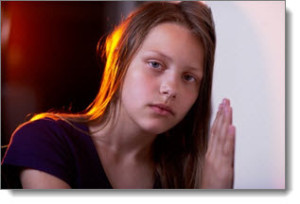One in three American children meets established criteria for depression, with onset typically at 10-11 years of age. The problem with diagnosing it in youth is determining its etiology, namely, is it biological (brain-based) or environmental. Since brain development, as well as all of the nerve systems that regulate mood, don’t fully develop until a person reaches their early 20s, it is logical to conclude that the onset of depression in young people is influenced by their upbringing, its particular circumstances and how they’ve weathered trying events during these early developmental years.
 The usual suspects are the culprits: Children reared by single parents, parental alcohol and substance abuse, domestic violence, sexual abuse, poverty, unemployment and overall chaotic, disorganized living.
The usual suspects are the culprits: Children reared by single parents, parental alcohol and substance abuse, domestic violence, sexual abuse, poverty, unemployment and overall chaotic, disorganized living.
What to look for:
- Persistent sadness throughout the school day, at home and play
- Lack of energy, motivation or enthusiasm in the classroom, schoolyard or at organized school activities and sports
- Changes in eating patterns (eating too much or too little)
- Falling asleep during class
- Irritability, agitation, unexplainable crying
- Morbid play that concentrates on a theme of harming themselves or others
- Boredom and failing grades
Also, depressed children often become loners, socially isolate and remain aloof. Their attitude is decidedly negative and there is an absence of joy in their lives. They’re fearful of engaging in benign, non-threatening activities, respond slowly or not at all to even simple cues and don’t readily engage in the classroom or with other students and school personnel. They lack self-mastery and confidence when it comes to performing assigned tasks and require an inordinate amount of help.
 How to proceed. Depression in children is a potentially serious matter, and any child exhibiting the symptoms and behaviors listed above should receive professional assistance — whether within a school system, for example, or via outside referral(s). Although symptoms may wax and wane, the depressed child will have to learn healthy, productive ways of coping day in and day out, while unlearning what perpetuates their depression. Putting off treatment can lead to the child decompensating even further, with potentially serious consequences to self or to others — an all too common phenomenon occurring in schools and homes. Also, if it is determined that the family, and its daily operation is part of the problem, all of those involved may need to enter treatment along with the identified child.
How to proceed. Depression in children is a potentially serious matter, and any child exhibiting the symptoms and behaviors listed above should receive professional assistance — whether within a school system, for example, or via outside referral(s). Although symptoms may wax and wane, the depressed child will have to learn healthy, productive ways of coping day in and day out, while unlearning what perpetuates their depression. Putting off treatment can lead to the child decompensating even further, with potentially serious consequences to self or to others — an all too common phenomenon occurring in schools and homes. Also, if it is determined that the family, and its daily operation is part of the problem, all of those involved may need to enter treatment along with the identified child.
If professional help is pursued, parents should be encouraged to seek a clinician who either routinely works with or specializes in treating mood disorders in children.
Medicating Depression in Youth. As to medicating depressed children, antidepressants have a rather checkered track record when it comes to symptom improvement. Only Prozac outperforms placebo in well-conducted research and clinical trials, with all of the others producing less than stellar results. Parents should be instructed not to jump at the opportunity to have their child medicated. Although claims abounded in recent years that antidepressants were unsafe, this has been largely debunked and didn’t result in an increased suicide risk, as previously thought. (The exception would be use in a child with a previous, documented suicide history.) The bigger risks are side effects (sedation, anxiety, insomnia, emotional blunting) which can be troublesome and more acute for children because of lack of body mass and underdeveloped adaptability skills.
The nature vs. nurture issue is an important consideration to evaluate before deciding upon treatment interventions with depressed children. And not be overlooked is that many children and adolescents don’t believe they’re good enough and then become immersed in self-loathing and self-deprecation tactics, fueling depression and making matters even worse.
Attribution Statement:
Joe Wegmann is a licensed pharmacist & clinical social worker has presented psychopharmacology seminars to over 10,000 healthcare professionals in 46 states, and maintains an active psychotherapy practice specializing in the treatment of depression and anxiety. He is the author of Psychopharmacology: Straight Talk on Mental Health Medications, published by PESI, Inc.
To learn more about Joe’s programs, visit the Programs section of this website or contribute a question for Joe to answer in a future article: joe@thepharmatherapist.com.